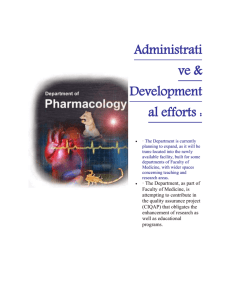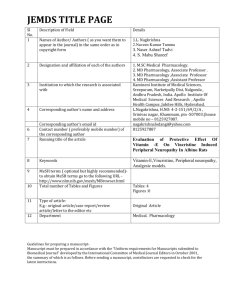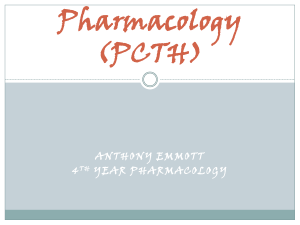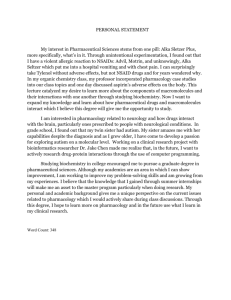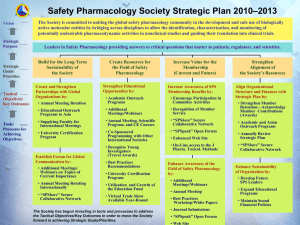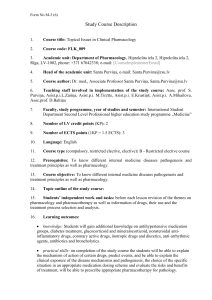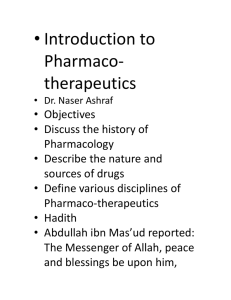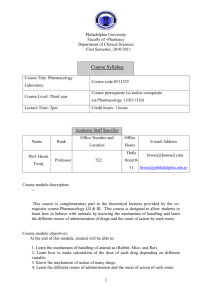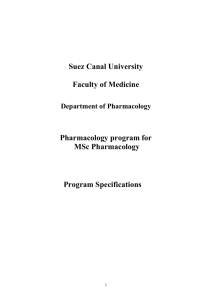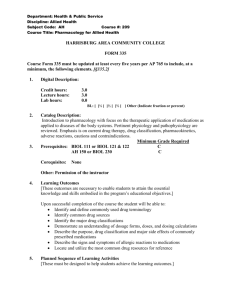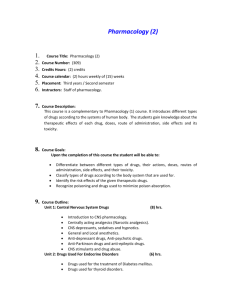section 1: module specifications
advertisement
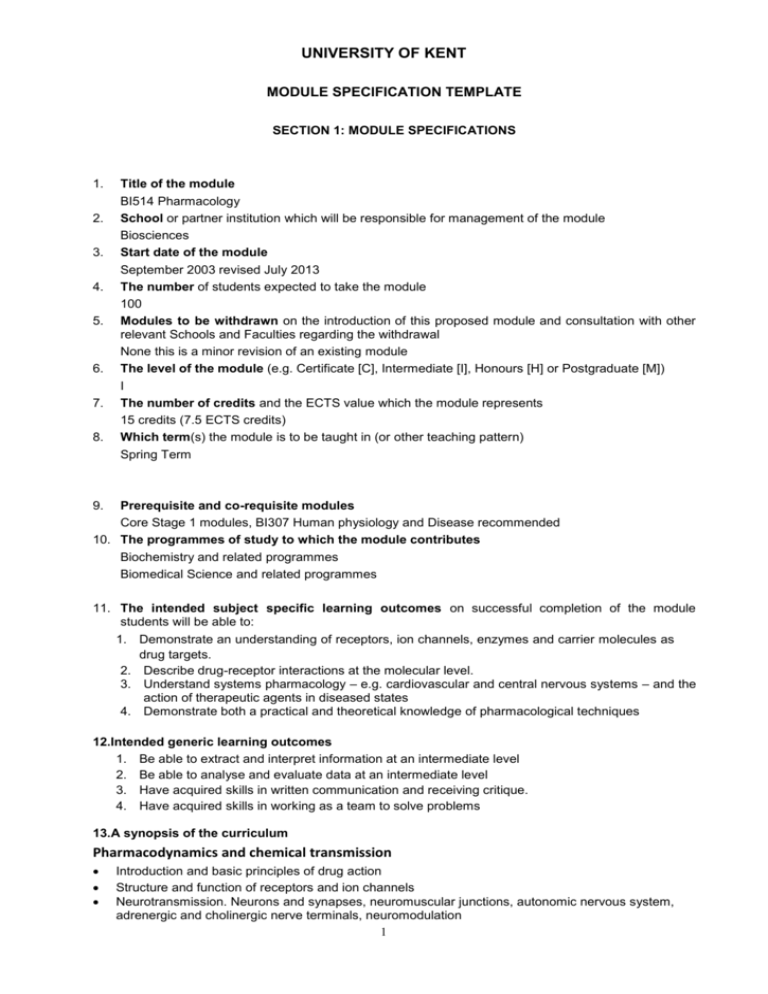
UNIVERSITY OF KENT MODULE SPECIFICATION TEMPLATE SECTION 1: MODULE SPECIFICATIONS 1. 2. 3. 4. 5. 6. 7. 8. Title of the module BI514 Pharmacology School or partner institution which will be responsible for management of the module Biosciences Start date of the module September 2003 revised July 2013 The number of students expected to take the module 100 Modules to be withdrawn on the introduction of this proposed module and consultation with other relevant Schools and Faculties regarding the withdrawal None this is a minor revision of an existing module The level of the module (e.g. Certificate [C], Intermediate [I], Honours [H] or Postgraduate [M]) I The number of credits and the ECTS value which the module represents 15 credits (7.5 ECTS credits) Which term(s) the module is to be taught in (or other teaching pattern) Spring Term 9. Prerequisite and co-requisite modules Core Stage 1 modules, BI307 Human physiology and Disease recommended 10. The programmes of study to which the module contributes Biochemistry and related programmes Biomedical Science and related programmes 11. The intended subject specific learning outcomes on successful completion of the module students will be able to: 1. Demonstrate an understanding of receptors, ion channels, enzymes and carrier molecules as drug targets. 2. Describe drug-receptor interactions at the molecular level. 3. Understand systems pharmacology – e.g. cardiovascular and central nervous systems – and the action of therapeutic agents in diseased states 4. Demonstrate both a practical and theoretical knowledge of pharmacological techniques 12.Intended generic learning outcomes 1. Be able to extract and interpret information at an intermediate level 2. Be able to analyse and evaluate data at an intermediate level 3. Have acquired skills in written communication and receiving critique. 4. Have acquired skills in working as a team to solve problems 13.A synopsis of the curriculum Pharmacodynamics and chemical transmission Introduction and basic principles of drug action Structure and function of receptors and ion channels Neurotransmission. Neurons and synapses, neuromuscular junctions, autonomic nervous system, adrenergic and cholinergic nerve terminals, neuromodulation 1 UNIVERSITY OF KENT Local transmission. Inflammatory response: role of histamine Systematic pharmacology The Cardiovascular System. Regulation of blood pressure, angina and cardiac failure The Respiratory System. Pathogenesis of asthma, mode of action of bronchodilators and antiinflammatory agents The Central Nervous System -Central neurotransmitters and opioids, Local and general anaesthetics, Treatment of anxiety and sleep disorders, Treatment of schizophrenia, Parkinson’s disease and mania/depression, Drugs of abuse and withdrawal symptoms The Gastrointestinal Tract. Pathogenesis and treatment of peptic ulcers, constipation and diarrhoea The Endocrine and Reproductive Systems. Corticosteroids, contraception and pregnancy, treatment of subfertility Chemotherapy. General principles of antibiotic/antiviral/antifungal/anticancer agents Practical: Drug receptor binding data analysis 14.Indicative Reading List Required Reading: Neal MJ, Medical pharmacology at a glance, 5th Edition, Blackwell Pub., 2005 Rang, H. P, Rang and Dale's pharmacology, 6th Edition, Churchill Livingstone, 2007 15.Learning and Teaching Methods, including the nature and number of contact hours and the total study hours which will be expected of students, and how these relate to achievement of the intended module learning outcomes The module will be taught through lectures and an associated data handling workshop and practical class The lectures will provide the detailed theoretical content for the module allowing achievement of learning outcomes 11.1-11.4 The practical class will allow achievement of outcomes 11.4, 12.1 – 12.4 The workshop will allow achievement of outcomes 11.3,11.4 , 12.1 – 12.4 Contact hours: Lectures: Practicals: Workshop: 22h 6h 3h Self-Study: Practical report: Workshop: Reading, revision: 24h 24h 71h Total: 150h 16.Assessment methods and how these relate to testing achievement of the intended module learning outcomes Workshop – pharmacology in practice Students will be presented with a series of clinical conditions, which will be discussed in the workshop. Students will then evaluate treatment possibilities for each of the conditions described, their mode of action, potential complications, and finally the most suitable therapeutic strategy for the individual patient (20%). 2 UNIVERSITY OF KENT This will test achievement of module outcomes 11.3,11.4 , 12.1 – 12.4 Practical The practical session proposed for this module will ensure that the students are cognisant with techniques which underpin our understanding of pharmacology and the development/characterisation of drugs for the treatment of disease (20%). This will test achievement of module outcomes 11.2, 11.4, 12-1 – 12.4 Examination: There will be an end of year examination requiring answers to essay type questions (60%). This will test achievement of module outcomes 11.1 -4, 12-3 17.Implications for learning resources, including staff, library, IT and space None this is a minor revision of an existing module 18.The School recognises and has embedded the expectations of current disability equality legislation, and supports students with a declared disability or special educational need in its teaching. Within this module we will make reasonable adjustments wherever necessary, including additional or substitute materials, teaching modes or assessment methods for students who have declared and discussed their learning support needs. Arrangements for students with declared disabilities will be made on an individual basis, in consultation with the University’s disability/dyslexia support service, and specialist support will be provided where needed. 19.Campus(es) where module will be delivered: Canterbury SECTION 2: MODULE IS PART OF A PROGRAMME OF STUDY IN A UNIVERSITY SCHOOL Statement by the School Director of Learning and Teaching/School Director of Graduate Studies (as appropriate): "I confirm I have been consulted on the above module proposal and have given advice on the correct procedures and required content of module proposals" ................................................................ .............................................. Director of Learning and Teaching/Director of Graduate Studies (delete as applicable) Date ………………………………………………… Print Name Statement by the Head of School: "I confirm that the School has approved the introduction of the module and, where the module is proposed by School staff, will be responsible for its resourcing" ................................................................. .............................................. Head of School Date ……………………………………………………. Print Name 3 UNIVERSITY OF KENT Module Specification Template Last updated February 2013 4

